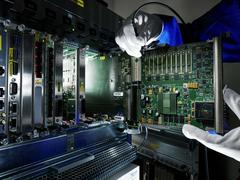URL: https://www.desy.de/news/news_search/index_eng.html
Breadcrumb Navigation
[LgDashBoard2@/e409/e116959/e119238][getObjProperty]: key=title[py] Traceback (most recent call last): File "/home/zeoclients/parts/products/zms/_objattrs.py", line 679, in getObjProperty value = metaObjAttr['py'](zmscontext=self) File "/home/zeoclients/parts/zope2/lib/python/Shared/DC/Scripts/Bindings.py", line 313, in __call__ return self._bindAndExec(args, kw, None) File "/home/zeoclients/parts/zope2/lib/python/Shared/DC/Scripts/Bindings.py", line 350, in _bindAndExec return self._exec(bound_data, args, kw) File "/home/zeoclients/parts/zope2/lib/python/Products/PythonScripts/PythonScript.py", line 328, in _exec result = f(*args, **kw) File "Script (Python)", line 6, in LgDashBoard2.title UnicodeDecodeError: 'ascii' codec can't decode byte 0xe2 in position 36: ordinal not in range(128)
News
News from the DESY research centre
Green light for industrial alliance “MicroTCA.4 Tech Lab”
DESY is setting up the “MicroTCA.4 Technology Lab”, along with private enterprises. This cooperative venture will continue to develop the electronics standard MicroTCA.4 and establish it for a large market. Over the next three years, the project will be funded as a “Helmholtz Innovation Lab”, with the Helmholtz Association providing almost 2.5 million euros. Together with the funds contributed by DESY and private-sector companies, the budget of the Innovation Lab will come to 5.07 million euros. “DESY is fundamentally restructuring the way in which innovation is promoted on the campus. The MicroTCA.4 Technology Lab is an important building block in the research centre’s innovation strategy. It will open up a new dimension of cooperation between DESY and private enterprises,” says DESY’s director Helmut Dosch.

The versatile MicroTCA.4 printed circuit boards have many applications. Credit: DESY/Heiner Müller-Elsner
MicroTCA.4 was developed by a consortium consisting of research institutions and industrial enterprises under the overall management of DESY, to the point where it is ready for use in the superconducting linear accelerator of the x-ray free-electron laser European XFEL currently under construction in Hamburg. The new MicroTCA.4 Tech Lab aims to open up new areas of application for this universally deployable technology. By continuously refining the hardware, software and support services, its deployment is to be simplified. To this end, new laboratory and testing facilities are being created, which will allow the new possibilities for configuration and integration to be tested and verified.
Direct customer support and an individualisation of the possible applications, right up to a turn-key system are also being planned. “ The MicroTCA.4 Tech Lab will provide a platform for a comprehensive network of developers, manufacturers, system integrators and users, in order to make the standard broadly useable – something that has never been done before in this way,” says Katja Kroschewski, who is in charge of technology transfer at DESY.
The Helmholtz Innovation Labs are strategically designed, long-term technology alliances between Helmholtz Centres and industrial enterprises. The MicroTCA.4 Technology Lab was successful in the first round of this new sponsorship programme of the Helmholtz Association. The Labs will initially be supported by the Association for three years. Following a successful interim evaluation, the sponsorship will be extended by another two years, after which the laboratories should be able to support themselves, for example through grants, spin-offs or industrial partners.



